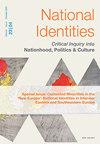二进制在民族主义研究中的应用
IF 0.7
Q3 POLITICAL SCIENCE
引用次数: 3
摘要
“超越民族主义的二元性”这一主题部分的引言批判性地回顾了二元性在民族主义研究中的使用。它指出理想类型的使用缺乏准确性是一个关键的失败,并指出了新的概念和类型。本节的贡献质疑二元对立的具体化,尤其是西方/东方和公民/种族及其伴随的偏见,而是强调民族主义特征中的某种意识形态流动性。本文章由计算机程序翻译,如有差异,请以英文原文为准。
The use of binaries in nationalism studies
ABSTRACT This introduction to the themed section 'Beyond Binaries of Nationalism' critically reviews the use of binaries in nationalism studies. It identifies a lack of precision in the use of ideal types as a key failing, and points to new conceptions and types. The contributions to the section question the reification of binaries, most especially western/eastern and civic/ethnic and their attendant biases, and instead emphasize a certain ideological fluidity in the character of nationalism.
求助全文
通过发布文献求助,成功后即可免费获取论文全文。
去求助
来源期刊

NATIONAL IDENTITIES
POLITICAL SCIENCE-
CiteScore
1.70
自引率
0.00%
发文量
37
期刊介绍:
National Identities explores the formation and expression of national identity from antiquity to the present day. It examines the role in forging identity of cultural (language, architecture, music, gender, religion, the media, sport, encounters with "the other" etc.) and political (state forms, wars, boundaries) factors, by examining how these have been shaped and changed over time. The historical significance of "nation"in political and cultural terms is considered in relationship to other important and in some cases countervailing forms of identity such as religion, region, tribe or class. The focus is on identity, rather than on contingent political forms that may express it. The journal is not prescriptive or proscriptive in its approach.
 求助内容:
求助内容: 应助结果提醒方式:
应助结果提醒方式:


